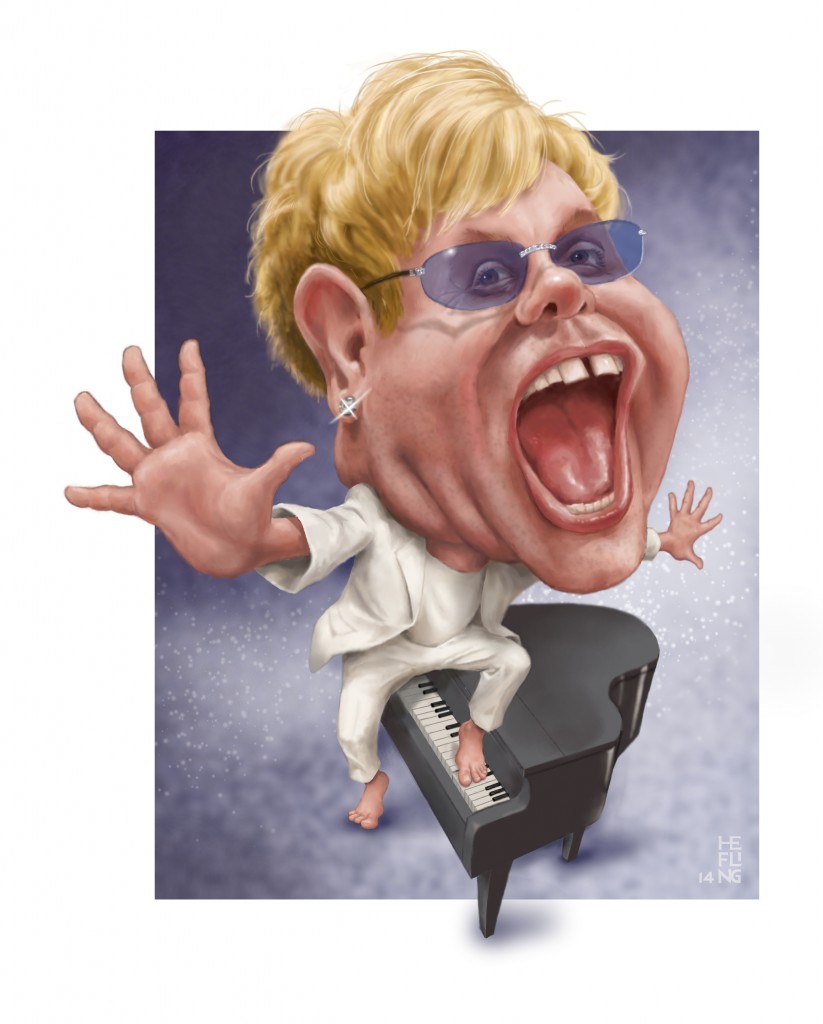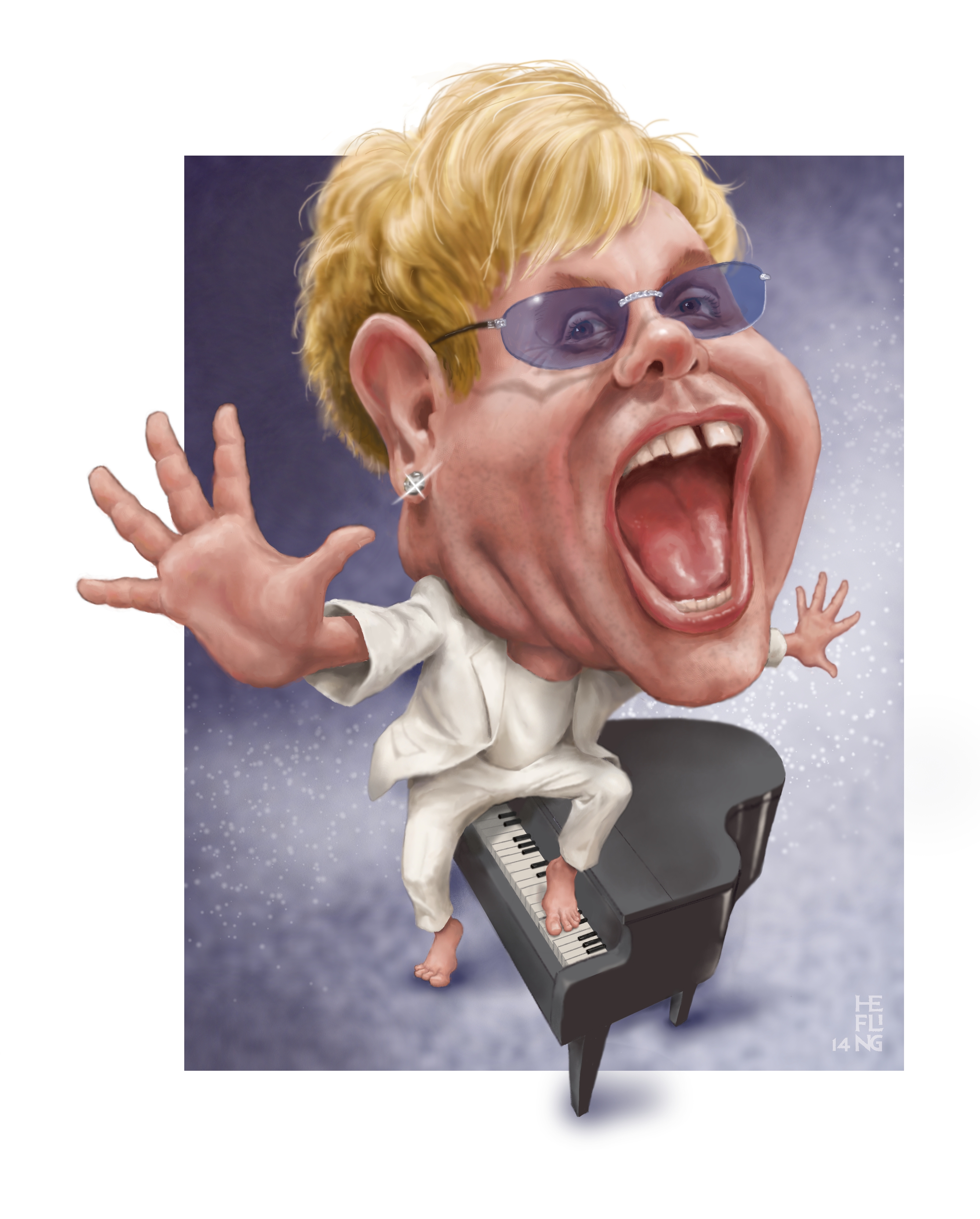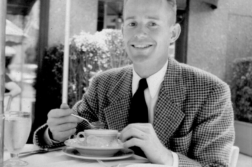The Diving Board
by Elton John
Capitol/Mercury Records
THOMAS WOLFE was right: you can’t go home again. That’s the sad-but-true wisdom at the heart of “Home Again,” the first single from Elton’s John’s latest album, The Diving Board. Sir Elton has cultivated one of the most cosmopolitan voices in popular music, and, true to form, “Home Again” spans the globe, from a “spooky little town” to the coast of Spain, where the singer never tires of “hearing songs about going home again.” Perhaps the lyric is a self-referential nod to 1973’s “Goodbye Yellow Brick Road” and its fond farewell to Dorothy’s Kansas.
Elton John’s voice is noticeably deeper than it was back then, and The Diving Board, which is the team effort of John’s lifelong collaborator  Bernie Taupin and über-producer T-Bone Burnett, is in every way the work of an older, wiser artist. “I hung out with the old folks in the hope that I’d get wise,” he sings on “Oceans Away,” while on the rousing “Mexican Vacation (Kids in the Candlelight),” he’s a family man carrying his child to bed. Apparently Saturday night’s all right for fighting, but now it’s Monday night and the kids have homework. On the heels of his bluesy collaboration with Leon Russell on 2010’s The Union, The Diving Board is a milestone in a major musical career. A Rock and Roll Hall of Famer, John has recorded nearly thirty consecutive Top 40 hits and sold more than 250 million records worldwide.
Bernie Taupin and über-producer T-Bone Burnett, is in every way the work of an older, wiser artist. “I hung out with the old folks in the hope that I’d get wise,” he sings on “Oceans Away,” while on the rousing “Mexican Vacation (Kids in the Candlelight),” he’s a family man carrying his child to bed. Apparently Saturday night’s all right for fighting, but now it’s Monday night and the kids have homework. On the heels of his bluesy collaboration with Leon Russell on 2010’s The Union, The Diving Board is a milestone in a major musical career. A Rock and Roll Hall of Famer, John has recorded nearly thirty consecutive Top 40 hits and sold more than 250 million records worldwide.
Born Reginald Dwight, John has said that when he changed his name from “Reg” to Elton John, he “became” Elton John. (It’s a riff on the old Cary Grant line that everyone wants to be Cary Grant, including Cary Grant.) The Grammy-Tony-Oscar winner is now 66 years old and the father of two with partner David Furnish. The Diving Board is John’s thirtieth solo album and, like Dylan’s Time Out of Mind (also his thirtieth), it ponders desire and mortality from the vantage point of old age. It’s Dylanesque, after all, to number your dreams, as John does on “Dream #1” through “Dream #3,” which are his best instrumentals since “Song for Guy” (from 1978’s A Single Man). But The Diving Board isn’t all sparse and somber balladry. “Can’t Stay Alone Tonight” and “Take This Dirty Water” ride a gospel wave. “My Quicksand,” which John says is one of the best in his catalogue, is too self-dramatizing to be taken seriously, but the abrupt shift in tempo, including a bar from Grieg’s “In the Hall of the Mountain King,” injects humor and the unpredictable into a song more soppy than sandy.
If there is one theme that resurfaces again and again in Elton John’s songwriting, it has to be the impermanence of fame, which in turn is a metaphor for mortality itself. What interests him about fame is how it vanishes, either abruptly (like a “Candle in the Wind”) or by degrees (“burning out his fuse up here alone,” as the legendary lyric from “Rocket Man” goes). Four decades later, the image of “the diving board” again captures the idea of being up in the air, like Dorothy in the hurricane, about to dive into another state of being altogether. Co-writer Taupin says the title song is meant to evoke “people like Judy Garland, the classic divas who dabbled with their own demons—a metaphor of fame.”
Elton John talked about his superstardom, and candidly so, in an interview last year with Rolling Stone’s Cameron Crowe (the director of Almost Famous). He described the inspiration behind his first gay love song (1981’s “Elton’s Song”), his battles with bulimia, alcohol, and cocaine, and his unyielding love of performing and of his husband David. But the most revealing memory involved another man named John—John Lennon—as the two were holed up in the Sherry-Netherland hotel in the 70s, “stoned out of our minds on coke.” When Andy Warhol came by, hoping to join the party, John and Lennon hid from him, afraid that the father of pop art would photograph them at two in the morning. Again it’s the paradox of celebrity, which may look to outsiders like a paradise, but can be a prison to insiders. The dark ironies abound: Warhol was shot by a fanatical fan, as was Lennon, fatally. Two other of John’s famous friends, Gianni Versace and Princess Diana, met with sudden, violent ends. Celebrity, for John, is a potential death sentence.
This familiar motif in Elton John’s canon is clinched by “Oscar Wilde Gets Out,” the album’s second track. Over the years John has created a veritable pantheon of characters: Daniel, Bennie, Levon, Lady Samantha, Captain Fantastic. Of course, these personae are really projections of the musician himself. Wilde is another mirror, another bisexual Brit who didn’t just get out but came out. Lest we forget, Wilde also wrote children’s stories, just as John did for Disney after rehab. In his homage to another fallen star, John traces the life of Wilde as an ex-con, a “golden boy in velveteen” landing in New York and “knowing how love makes fools of us all.” The song is entirely retrospective: “The past is so seductive,” Sir Elton sings, “long before the lords and law/ Branded Oscar Wilde a sinner.” The album is full of such backward glances and it brims with self-assurance and sagacity.
Colin Carman, PhD, teaches literature at Colorado Mesa University.






